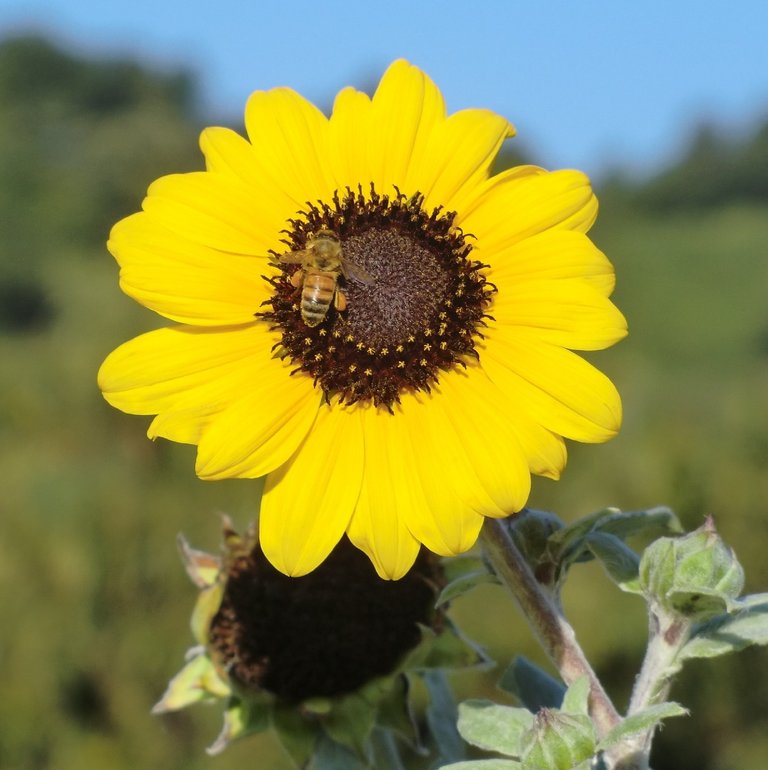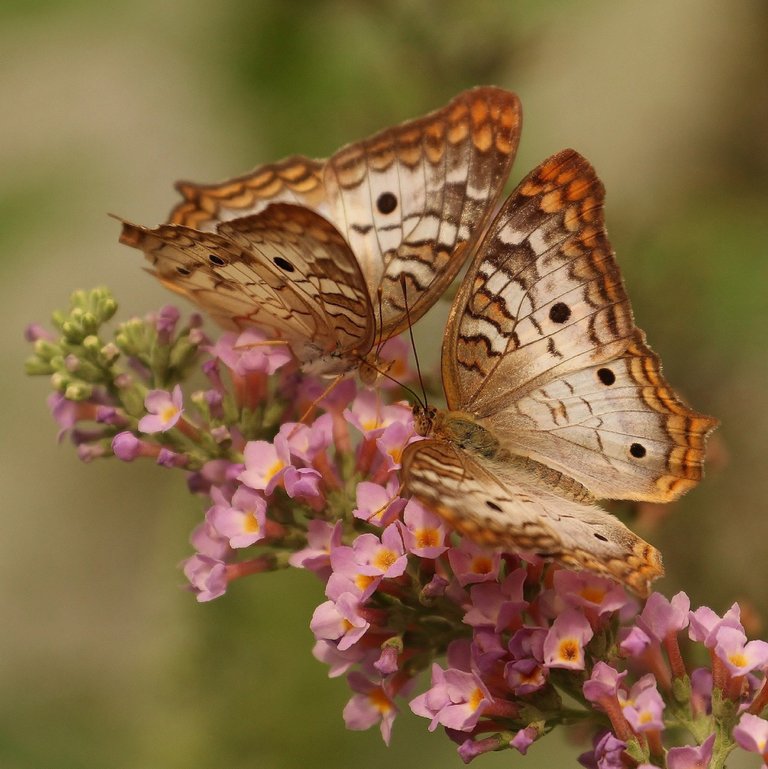Hi everyone.
A few days ago I was talking to @Phage93, a phenomenal guy that I got to know on this platform. In particular, we were confronting the fact that, in nature, smells seem to have a fundamental importance in the biological interaction between animals, humans and the environment. Hence the idea of deepening the issue by consulting the scientific literature. I will start by telling something from the animal world, and then moving towards man.
Let's begin!

Photo by Hermann Traub from Pixabay
The magical world of bees
According to some studies [1], pheromones are chemical signals of fundamental importance in the complex ecosystem of bees.
A honeybee colony is a veritable eusocial society of largely sterile female workers, “ruled” by a single reproductive monarch. The absence of chemical regulation by the queen leads to reproductive anarchy!
In particular, the pheromones released by the queen can influence the behaviour of other members of the colony, for example by modulating aggression, attracting workforce and inhibiting the production of new queens.
But it does not end here: the queen's pheromones also have long-term effects, such as the reduction of female fertility. Already from this, we can understand how the smell chemistry is one of the most developed senses in the world of bees.
Honeybees play an irreplaceable role in ecosystems through pollination. However, they face multiple threats of predation: weaver ants, spiders, mantises, hornets and birds. In order to protect the colony and the individual from threats of predation, as widely discussed here [2], honeybees use the alarm pheromone to quickly communicate with their hive mates. Here is another example that explains the importance of the volatile chemical compounds.
But what happens if the delicate odorous ecosystems of bees are altered, for example with the pheromones produced by lactic acid when a human being is angry or afraid?
Bees are very sensitive to perfumes. Humans who release certain types of body chemicals or who express levels of fear or aggression can threaten bees, causing them to sting!
In addition, most humans move quickly at the sight of the bee, attempting to crush other bees that fly nearby. The bee interprets it as a hostile act and, therefore, will tend to sting and release a pheromone to summon other bees to sting!
Therefore, always try to stay calm so as not to make the situation worse.

Photo by CookDrake from Pixabay
The attraction for mosquitoes
To date, there is no complete explanation as to why one person receive more mosquito bites than others, when both are equally accessible. Nonetheless, there is a lot of evidence that claims that mosquito attraction is based on the chemistry of volatile odorous compounds.
In fact, according to a recent study [3], people with high concentrations of steroids or cholesterol on their skin surface would attract mosquitoes more.
Carbon dioxide also attracts these insects and, consequently, pregnant women (who expire more of it) would be more at risk. Mosquitoes can sense the carbon dioxide exhaled several meters away!
Finally, other observations [4] highlight the fact that there would be compounds such as 6-MHO (6-methyl-5-heptan-2-one) and GA (geranyl-acetone) which would be natural repellents.
All skin emanations would, in principle, attract mosquitoes, but individuals who produce 6-MHO and GA in appropriate proportions would produce a natural repellent that can counteract attractants!

Photo by ElinaElena from Pixabay
The sense of smell in humans
The importance of the sense of human sense of smell has historically been very underestimated. This is because, compared to other animals, we have a much smaller number of olfactory receptors in the nasal mucosa. This statement, however, is not entirely exhaustive.
As a recent study [5] explains, man's nasal mucosa can be functionally divided into the respiratory and olfactory region. The latter contains sensory cells.
Since we are very complex organisms, we can deduce that the chemical transmission of the sense of smell is also.
The ability to be able to distinguish many different smells suggests that very specific receptors exist and the excitation of the axons of the sensory cells is accomplished when a chemical molecule performs an interaction with the receptor in the olfactory membrane.
Not much is known about the classification of the different receptors, but it is suspected, however, that our high cognitive power allows us to better use the olfactory input than other mammals. We would therefore have learned to compensate for the small number with quality.

Photo by Fr. Romain Marie Bancillon from Pixabay
Human pheromones
In humans, pheromones are mainly produced by the apocrine glands of the skin, but we can also find them in glandular secretions of the wet areas of the body (armpits, mouth, feet and genitals).
According to some recent considerations [5], pheromones play a very important role in several physiological aspects:
- They regulate ovulation in women, acting on the levels of luteinizing and follicle-stimulating hormones;
- They are responsible for the pulsatility of the luteinizing hormone in men;
- They increase salivation in men;
- ...
In this regard, a research [6] conducted around 30 years ago has shown that menstrual cycles of women who live together or who are close friends tend to converge over time.
This suggests that the biological clock is influenced by social proximity and a fundamental role is certainly played by pheromones and other chemical molecules.
Knowing that humans can communicate with pheromones is decidedly innovative and opens many possibilities for future applications. For example, they could be used as a natural and alternative basis to control ovulation time as an aid in female contraception.
Furthermore, we may find that other aspects of our behaviour and physiology are influenced by the olfactory messages of other people during social interactions, giving rise to sensations such as empathy. In short, this research field is still to be explored!
I love you with all my ... Nose
Many studies have been conducted on the sense of smell and the life of a couple. Here are some of them that, in my opinion, are quite interesting!
In the first study [7], a hundred women were exposed to three different perfumes (that of their partner, that of a stranger and a neutral perfume) in the presence of some acute stressors. Throughout the experience, perceived stress and cortisol level were measured.
The conclusion was that perceived stress is reduced in women exposed to their partner's perfume! In contrast, cortisol levels were high in women exposed to a stranger's perfume.
In conclusion, this study reveals that social perfumes can influence psychological and physiological reactions to stress.
The second study I decided to tell you about [8] is based on observing the exposure to partner’s perfume with respect to sleep quality.
155 participants spent 2 nights with their partner's perfume and 2 nights with a neutral perfume and sleep was measured through sleep efficiency (with actigraphy) and perceived sleep quality.
The result was that sleep efficiency is greater in the presence of the partner's smell! This regardless of whether the participants knew which perfume it was or not.
We can conclude that perfumes can also have a social impact on sleep.

Photo by Pete Linforth from Pixabay
That's all for today.
I am increasingly amazed by the beauty of life and it is incredible how many things exist that we cannot see with our eyes. I am happy that science helps us in this sense!
Many aspects have been studied, but many more are those which are still being sought for explanation. The prospects are many and I can't wait to find out more!
I hope you enjoyed this post!
Let me know what you think.
See you next time,
Delilha
ITA
Ciao a tutti.
Alcuni giorni fa stavo parlando con @Phage93, un ragazzo fenomenale che ho avuto modo di conoscere su questa piattaforma. In particolare, ci stavamo confrontando sul fatto che, in natura, gli odori sembrano avere un’importanza fondamentale nell’interazione biologica tra animali, uomo e ambiente. Da qui l’idea di approfondire la questione consultando la letteratura scientifica. Inizierò dal raccontare qualcosa dal mondo animale, per poi spostarmi verso l’uomo.
Iniziamo!

Foto di Hermann Traub da Pixabay
Il magico mondo delle api
Secondo alcuni studi [1], i ferormoni sono segnali chimici di importanza fondamentale nel complesso ecosistema delle api.
Una colonia di api da miele è una vera e propria società eusociale di lavoratrici in gran parte sterili, "governate" da un singolo monarca riproduttivo. All’assenza della regolazione chimica da parte della regina, consegue l'anarchia riproduttiva!
In modo particolare, i ferormoni rilasciati dalla regina possono influenzare il comportamento di altri membri della colonia, ad esempio modulando l’aggressività, attirando forza lavoro e inibendo la produzione di nuove regine.
Ma non finisce qui: i ferormoni della regina hanno anche effetti a lungo termine, come la riduzione della fecondità femminile. Già da questo, possiamo comprendere come la chimica dell’olfatto sia uno dei sensi più sviluppati nel mondo delle api.
Le api da miele svolgono un ruolo insostituibile negli ecosistemi attraverso l'impollinazione. Tuttavia, esse devono affrontare molteplici minacce di predazione: formiche tessitrici, ragni, mantidi, calabroni e uccelli. Al fine di proteggere la colonia e l'individuo dalle minacce di predazione, come ampiamente discusso qui [2], le api da miele usano il feromone di allarme per comunicare rapidamente con i loro compagni di alveare. Ecco quindi un altro esempio che spiega l’importanza dei composti chimici volatili.
Ma cosa succede se si vanno ad alterare i delicati ecosistemi odorosi delle api, ad esempio con i ferormoni prodotti dall'acido lattico quando un essere umano è arrabbiato o impaurito?
Le api sono molto sensibili ai profumi. Gli esseri umani che rilasciano un certo tipo di composti chimici corporei o che esprimono livelli di paura o aggressività possono minacciare le api, provocandone la puntura!
Inoltre, la maggior parte degli esseri umani si muove rapidamente alla vista dell’ape, tentando di schiacciare le altre api che volano vicino. L'ape lo interpreta come un atto ostile e, quindi, tenderà a pungere e a rilasciare un feromone per convocare altre api a pungere!
Cercare, quindi, di mantenere sempre la calma per non peggiorare la situazione.
L’attrazione per le zanzare
Ad oggi, non esiste una spiegazione completa del perché una persona riceva più punture di zanzara rispetto alle altre, quando entrambe sono ugualmente accessibili. Ciò nonostante, sono molte le prove che sostengono che l’attrazione da parte delle zanzare sia basata sulla chimica di composti odorosi volatili.
Infatti, secondo un recente studio [3], le persone con alte concentrazioni di steroidi o colesterolo sulla loro superficie cutanea attirerebbero maggiormente le zanzare.
Anche l’anidride carbonica attrae questi insetti e, di conseguenza, le donne incinte (che ne espirano una quantità maggiore) sarebbero soggetti più a rischio. Le zanzare possono percepire l’anidride carbonica esalata a svariati metri di distanza!
Infine, altre osservazioni [4], mettono in luce il fatto che esisterebbero dei composti, come 6-MHO (6-metil-5-eptan-2-one) e GA (geranil-acetone) che sarebbero dei repellenti naturali.
Tutte le emanazioni cutanee attirerebbero, in linea di principio, le zanzare, ma gli individui che producono 6-MHO e GA in proporzioni appropriate produrrebbero un repellente naturale in grado di contrastare gli attrattivi!

Foto di ElinaElena da Pixabay
L’olfatto negli esseri umani
L'importanza del senso dell'olfatto umano è stata storicamente molto sottovalutata. Questo perché, a confronto di altri animali, noi possediamo un numero molto minore di recettori olfattivi nella mucosa nasale. Questa affermazione, però, non è del tutto esaustiva.
Come spiega un recente studio [5], la mucosa nasale dell’uomo può essere suddivisa funzionalmente in regione respiratoria e olfattiva. Quest’ultima contiene le cellule sensoriali.
Essendo noi organismi molto complessi, possiamo dedurre che anche la trasmissione chimica del senso dell’olfatto lo sia.
La capacità di essere in grado di distinguere molti odori diversi suggerisce che esistano dei recettori molto specifici e l’eccitazione degli assoni delle cellule sensoriali si compie quando una molecola chimica compie un’interazione con il recettore nella membrana delle ciglia olfattive.
Non si sa ancora molto della classificazione dei diversi recettori, ma si sospetta, tuttavia, che il nostro potere cognitivo elevato consenta di utilizzare meglio l'input olfattivo rispetto ad altri mammiferi. Avremmo, quindi, imparato a compensare lo scarso numero con la qualità.

Foto di Fr. Romain Marie Bancillon da Pixabay
I ferormoni umani
Nell’uomo, i ferormoni vengono prodotti principalmente dalle ghiandole apocrine della pelle, ma possiamo trovarli anche in secrezioni ghiandolari delle zone umide del corpo (ascelle, bocca, piedi e genitali).
Secondo alcune recenti considerazioni [5], i ferormoni hanno un ruolo molto importante in diversi aspetti fisiologici:
- Regolano l’ovulazione nelle donne, agendo sui livelli degli ormoni luteinizzante e follicolo-stimolante;
- Sono responsabili della pulsatilità dell’ormone luteinizzante negli uomini;
- Aumentano la salivazione negli uomini;
- …
A questo proposito, una ricerca [6] condotta circa 30 anni fa, ha mostrato che i cicli mestruali di donne che abitano insieme o che sono amiche intime tendono a convergere nel tempo.
Questo suggerisce che l’orologio biologico sia influenzato dalla vicinanza sociale e un ruolo fondamentale è sicuramente svolto proprio dai ferormoni e da altre molecole chimiche.
Sapere che gli umani possono comunicare con i feromoni è decisamente innovativo e apre molte possibilità per future applicazioni. Ad esempio, essi potrebbero essere utilizzati come base naturale e alternativa per controllare il tempo di ovulazione come aiuto nella contraccezione femminile.
Inoltre, potremmo scoprire che altri aspetti del nostro comportamento e della nostra fisiologia sono influenzati da messaggi olfattivi di altre persone durante le interazioni sociali, dando origine a sensazioni come l’empatia. Insomma, questo campo di ricerca è ancora tutto da esplorare!
Ti amo con tutto il mio… Naso
Sono stati condotti molti studi in merito al senso dell’olfatto e la vita di coppia. Di seguito ne riporto qualcuno che, a mio avviso, è piuttosto interessante!
Nel primo studio [7], un centinaio di donne sono state esposte a tre profumi diversi (quello del loro partner, quello di uno sconosciuto e un profumo neutro) in presenza di alcuni fattori di stress acuto. Durante tutta l’esperienza, sono state misurati lo stress percepito e il livello di cortisolo.
La conclusione è stata che lo stress percepito è ridotto nelle donne esposte al profumo del partner! Al contrario, i livelli di cortisolo erano elevati nelle donne esposte al profumo di uno sconosciuto.
In conclusione, questo studio rivela che i profumi sociali possono influenzare le reazioni psicologiche e fisiologiche allo stress.
Il secondo studio di cui ho deciso di parlarvi [8] si basa sull’osservazione dell’esposizione al profumo del proprio partner rispetto alla qualità del sonno.
155 partecipanti hanno trascorso 2 notti con il profumo del proprio partner e 2 notti con un profumo neutro e il sonno è stato misurato attraverso l’efficienza del sonno (con actigrafia) e la qualità del sonno percepita.
Il risultato è stato che l’efficienza del sonno è maggiore in presenza dell’odore del proprio partner! Questo indipendentemente dal fatto che i partecipanti sapessero o meno di quale profumo si trattasse.
Possiamo concludere che i profumi possono avere un impatto sociale anche sul sonno.

Foto di Pete Linforth da Pixabay
Per oggi è tutto.
Sono sempre più meravigliata dalla bellezza della vita ed è incredibile quante cose esistano che noi non possiamo vedere con gli occhi. Sono felice che la scienza ci venga in aiuto in questo senso!
Molti aspetti sono stati studiati, ma molti di più sono quelli di cui si è ancora alla ricerca di spiegazione. Le prospettive future sono parecchie e non vedo l’ora di saperne di più!
Spero che vi sia piaciuto questo post!
Fatemi sapere cosa ne pensate.
Alla prossima,
Delilha
Sources – Fonti:
[1] https://pubmed.ncbi.nlm.nih.gov/30962449/?from_term=bee+scent&from_pos=8
[2] https://www.mdpi.com/2075-4450/10/10/366/htm
[3] https://www.webmd.com/allergies/features/are-you-mosquito-magnet#1
[4] https://www.ncbi.nlm.nih.gov/pmc/articles/PMC5740115/
[5] http://evolution.anthro.univie.ac.at/institutes/urbanethology/resources/pdf/NEL220501R01_.pdf
[6] https://www.sciencedirect.com/science/article/pii/S0018506X11002704
[7] https://pubmed.ncbi.nlm.nih.gov/29293018/
[8] https://pubmed.ncbi.nlm.nih.gov/32163721/


Ottimo lavoro :)
Una delle cose più interessanti legate all'olfatto, secondo me, è il richiamo alla memoria di sensazioni, posti visitati, situazioni particolari che avevamo dimenticato.
Ma basta un soffio e ritornano prepotenti.
Un post cosi piacerà sicuramente ad @amico
Ti mando, se riesco, un altro profumo !BEER
Grazie della segnalazione, @ciuoto... mi salvo il post per una più attenta lettura appena avrò tempo.
Un caro abbraccio 🤗 e qualche goccia di !BEER 🍻
Hai proprio ragione, è un altro aspetto molto interessante! Noi possiamo anche pensare di dimenticare determinate situazioni o persone, ma il nostro cervello ha una memoria di ferro :)
Sempre ben apprezzata la !BEER , grazie per essere passato! :)
Sorry, you don't have enough staked BEER in your account. You need 24 BEER in your virtual fridge to give some of your BEER to others. To view or trade BEER go to hive-engine.com
View or trade
BEER.Hey @ciuoto, here is a little bit of
BEERfrom @amico for you. Enjoy it!Learn how to earn FREE BEER each day by staking your
BEER.Bellissimo articolo e molto completo, gran lavoro anche con le fonti. Unico neo, dire a @phage93 di essere eccezionale, sia mai si monti la testa!
complimenti e piacere di conoscerti @delilhavores
Grazie mille per essere passato :)
Ahahah questa mi ha stesa!
Piacere mio di conoscerti!
Una buona giornata :)
ma come... io l'ho votata per quello!!!
Articolo incredibile, peccato poter dare solo 1 voto!
Grazie mille, lo apprezzo molto!! :)
ma che meraviglia! Io poi ho l'olfatto superdotato, l'unica cosa che mi funziona bene, agli odori che sento collego molte esperienze della mia vita, come ad esempio lìodore del mare che riesco a percepire anche a qualche chilometro oppure ho perfettamente coscienza di alcuni odori che riuscirei a riprodurli se ne avessi la possibilità tecnologica.
anche se puzza??? nota bene ho imparato a citare grazie a te!
Ahahah! Questa mi ha stesa, sei troppo forte Armando!
Riguardo alla possibilità tecnologica sarebbe bellissimo, pensa se un giorno si potessero inviare profumi attraverso un messaggio allo stesso modo in cui si manda un video... Chissà :)
Mi fa piacere!
Grazie per essere passato, alla prossima :)
Tutto molte interessante @delilhavores!
Devo indagare per quanto riguarda la questione ape regina e feromone, ancora è tutto in fase di ricerca, quindi ogni giorno se ne sente una nuova.
Direi di abolire gli affitti per le case "solo studentesse", dopo questa news!!XD
Grazie per questo articolo colmo di informazioni!
Grazie!! :)
Fammi sapere se scopri qualcosa di più sull'ape regina!
Bellissimo post, ricco di curiosità interessanti trattate in maniera impeccabile.
Mi fa molto piacere. Grazie per essere passato e per il tuo supporto :)
Congratulations @delilhavores! You have completed the following achievement on the Hive blockchain and have been rewarded with new badge(s) :
You can view your badges on your board And compare to others on the Ranking
If you no longer want to receive notifications, reply to this comment with the word
STOPDo not miss the last post from @hivebuzz:
Support the HiveBuzz project. Vote for our proposal!
This post was shared and voted inside the discord by the curators team of discovery-it
Join our community! hive-193212
Discovery-it is also a Witness, vote for us here
This post was shared in the Curation Collective Discord community for curators, and upvoted and reblogged by the @c-squared community account after manual review.
@c-squared runs a community witness. Please consider using one of your witness votes on us here
Manually curated by the Qurator Team in partnership with @discovery-blog.
Keep up the good work!
Link all'articolo sulla Pagina Facebook di Hive Italia
Grazie :)
a te :)